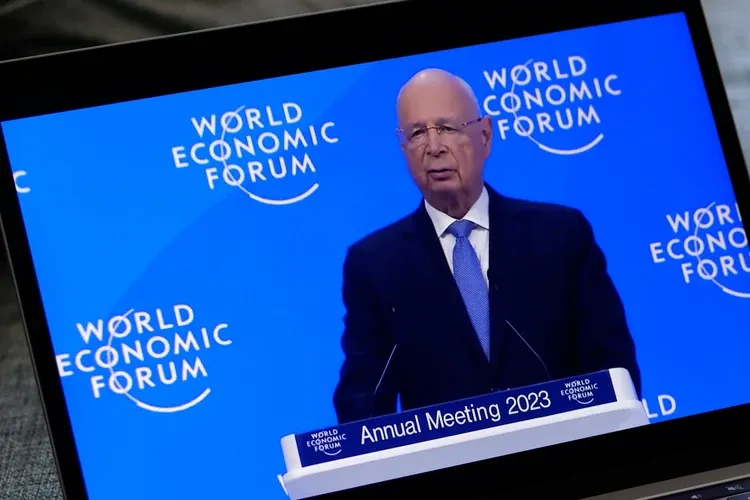World Economic Forum Chairman Klaus Schwab heaped praise on the Chinese Communist Party last week as the regime commits genocide in Xinjang and struggles to mitigate the effects of its draconian population control tactics.
“In the first half year, China has made remarkable achievements in economy, in social development, in diplomacy, and in many other areas,” Schwab said as part of a “Summer Davos” in the Chinese city of Tianjin. His remarks served as an introduction for Chinese Premier Li Qiang’s boasting about his nation’s economy, which has been partially supported by slave labor.
Schwab also appeared to tell Li “we are eager to learn from your vision on China and the world.” Nowhere in his opening remarks did Schwab mention the CCP’s ongoing genocide of Uyghurs, who have reportedly been subjected to forced sterilization, abortions, and horrific rape.
Reports of ethnic cleansing corroborated by satellite imagery and victim testimonies have been surfacing for years while the CCP continues to deny the reality of the human rights abuses. That’s probably why the Chinese government tried to prevent Uyghur activist Dolkun Isa from speaking at the United Nations this year.
The past several months also saw additional sanctions from the United States on companies allegedly tied to forced Uyghur labor even as the CCP seems unresponsive to complaints about its human rights abuses. Reports also indicate that Chinese repression extended overseas where Uyghurs allegedly faced harassment and potential spying from CCP authorities. In mainland China, the repression has been so severe that the Canadian government passed a unanimous motion in February to resettle 10,000 Uyghurs.
The State Department said in its recent International Religious Freedom Report that there are as many as 1.8 million Uyghur, Kazakh, Kyrgyz, and other Muslims detained in a vast network of concentration camps across the region of Xinjiang. China, officially an atheist state, also persecutes Roman Catholics, Protestants, and Buddhists.
“The CCP has long repressed religious freedom and in recent years has become increasingly hostile toward religion, implementing campaigns to ‘sinicize’ Islam, Tibetan Buddhism, and Christianity to remove alleged ‘foreign influences,’” the report said. “These policies require religious groups to support the CCP, including by altering their religious teachings to conform to CCP ideology and policy. Both registered and unregistered religious groups that run afoul of the CCP face harassment, detention, arrest, imprisonment, and other abuses.”
It’s unclear exactly how extensive the CCP’s repression is but one analysis suggested that nearly 23,000 Uyghurs were in a camp or prison in 2017 and 2018. The nation had more than 380 concentration camps as of 2019, according to data from the Australian Strategic Policy Institute, while some of the nation’s camps have been converted into formal prisons.
The nature of the abuse goes beyond mere detainment and entails horrific sexual and reproductive violations that expose the government’s interest in ethnic cleansing. The regime even banned the BBC two years ago after it reported on allegations that authorities raped detainees with electrocuting instruments, as well as forced others to watch a woman’s rape.
German researcher Adrian Zenz has estimated that China’s policies could cut Uyghur and other ethnic minorites’ births by 2.6 to 4.5 million in southern Xinjiang. That represents one-third of the region’s minority population for the next twenty years. Zenz also estimated that as a result, the proportion of the region’s Han population would grow substantially.
China’s repressive policies may be especially harmful to Uyghurs but they resemble the same coercive tactics they used on their majority Han population, fostering a demographic crisis. The nation posted its first population decline last year, followed by a steep decline in marriage rates reported this year. Both are no doubt the result of CCP efforts like the one-child policy, which then-Vice President Joe Biden once told a Chinese audience he “fully” understood.
The Chinese government said in 2013 that doctors had performed 196 million sterilizations and 330 million abortions since 1971. Compare that to the estimated 63 million abortions that occurred in the United States since the Supreme Court issued its opinion in Roe v. Wade two years later.
The one-child policy eventually ended in 2016 and the regime allowed families to have three children by 2021. Chinese companies are even paying their employees to have children, as Trip.com Group announced it would do last week.
“Employees are our greatest asset to the company and we are committed to creating a better and more supportive working environment for them,” the company said in a statement. “Through the introduction of this new childcare benefit, we aim to provide financial support that will encourage our employees to start or grow their families without compromising on their professional goals and achievements.”
For its part, the government has explored a variety of tactics aimed at boosting fertility, including supporting IVF and other fertility treatments as part of its national insurance policy. It’s unclear how effective measures like those will be after decades of degrading reproductive capacity and creating an unbalanced sex ratio.
Besides leading to a demographic imbalance, China’s policies have also created an underclass of children born outside of the one-child policy, known as the “black children” or “Heihaizi,” who lack official government recognition. The children also cannot inherit property, receive medical insurance coverage, or join the armed forces.



